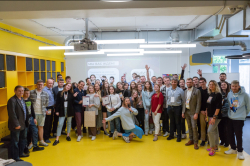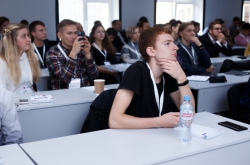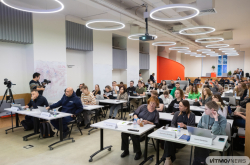The second round of the GenerationS TechNet Track started at ITMO University on March 1. Its participants visited such industrial enterprises in the region as the Prometey Research Institute, Sredne-Nevsky Shipyard, Lenpoligrafmash, MOBAHAUS technopark and the Kirov Plant. They had an opportunity to get acquainted with the specifics of the companies, as well as meet with experts to discuss the business components of their projects.
“The acceleration track has changed a lot. Compared to last year, we revised not only the educational part, but the entire approach to the track. We now have an investor who is ready to support several projects. The key success factor for us is how much money the projects will receive”, shared Dmitry Ivanov, Director for Innovative Development of NPO Saturn.

Finalists
On March 10 the TechNet Track acceleration program came to an end, and the jury named five finalists who can now take part in the GenerationS Superfinal and compete for the grand prize. Three best startups have shared the prize fund of 1 million rubles.
The first place and a prize of 500,000 rubles went to the team FDM ver. 2.0, who presented an extruder (a printing module) for 3D-printers. This technology ensures increased speed and quality of printing. The product is intended for 3D-printer manufacturers, 3D-printing studios, as well as for manufacturers of products from composites and low-melting metals. Printers with this extruder can be used in various fields, including chemical, medical, automotive and aerospace industries.

“Our extruder is compatible with almost all 3D-printers, including robotic ones. We’ve only made a pilot model so far, but we’re going to think over our business strategy, launch the first batch, join forces with another TechNet GenerationS team and join the Skoltech team”, explained Evgeniy Matveev, a post-graduate student of Perm National Research Polytechnic University.
The second place and a prize of 300,000 rubles went to the Yekaterinburg team SEMA, headed by Sergei Kokshakov, who have developed the industrial moisture absorber SEMA. UC RUSAL, GAZ Group, Evraz Group and other big Russian companies are among the team’s clients.

“Our participation in the acceleration program has allowed us to develop our strategy much faster that we expected. Now we’re going to meet with our partners from Rybinsk to discuss the details of our partnership”, shared Sergei Kokshakov, SEMA project manager.
The third place and a prize of 200,000 rubles went to Stimul Group Company, a producer of polymer additives. The company has already received 60 million rubles to construct a production plant for polymer composite materials.

Among the finalists was also VR Concept, a developer of virtual prototyping software. The team has developed a software product that allows users to create full-scale digital models, apply engineering calculations and employ various software algorithms. This technology is widely used to control the quality of production, detect errors, train new employees and present models of new products to customers.

The last finalist of the GenerationS TechNet Track was A.A.C Polymers, a company from Volgograd which produces a heat-conducting composite.
Natalia Podsosonnaya, General Director of Sberinvest Company, also attended the DemoDay. She announced that Sberinvest is ready to support five projects: SEMA, Lab365, Cybersklad, Stimul Group and FDM ver. 2.0. Ms. Podsosonnaya explained that when choosing startups, the experts mainly paid attention to the progress made during the acceleration track, entrepreneurial activity and the way the participants responded to feedback.

“TechNet is a complicated track: it takes a long time and money to cross the bridge from an idea to its implementation. It attracted many talented people and promising startups. I’ve seen the teams make great progress, and for the teams it’s not only about developing business strategies, but also about feeling a desire to become leaders in the market, which is the key factor for success”, said Natalia Podsosonnaya.




